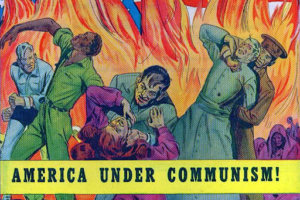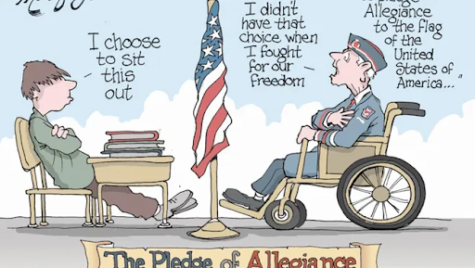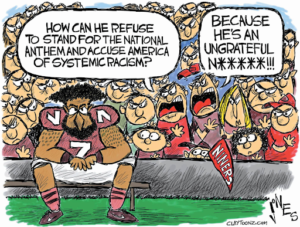The Pledge of Allegiance and Pentucket

Photo: The esaltlaketribune, caglecartoons.com
October 26, 2021
To stand or not to stand during the pledge of allegiance. To salute our country or steer clear of nationalism. The question of whether or not every American is obligated to stand for the pledge of allegiance or national anthem has been heavily discussed ever since their creation. The concerns over ethical implications surrounding both standing and sitting have developed a stigma from both sides of the debate. But is the right answer just black and white? Is there an obvious right or wrong that one-half of America has just been missing?
The answer to this, like most high-profile questions in society, is no. There’s no obvious right or wrong answer because all sides have valid reasoning for doing what they do. In this article, I hope to dissect the stigmas that both sides have towards what the other party chooses to do while the pledge of allegiance is being read. I also plan to assess the history of both the pledge and its skeptics, as well as explain my own personal beliefs on why I choose to sit out for it during school.
The Origins
The original pledge of allegiance was written in 1892 by Francis Bellamy with no specific intention to be utilized the way it is now. It read “I pledge allegiance to my Flag and the Republic for which it stands, one nation, indivisible, with liberty and justice for all.”
It wasn’t until 31 years later in 1923 that the pledge was adopted by American schools and institutions, but the process of standing and saluting the pledge in schools wasn’t enforced until the mid-1950s.
In 1954, in response to the alleged threat of communism at the hands of Russia, President Eisenhower encouraged Congress to add the words “under God,” creating the 31-word pledge we say today. He also signed a bill that stated every public school would be required to read the pledge aloud for students each morning.
In a statement regarding the bill, Eisenhower said “FROM THIS DAY FORWARD, the millions of our school children will daily proclaim in every city and town, every village and rural school house, the dedication of our nation and our people to the Almighty. To anyone who truly loves America, nothing could be more inspiring than to contemplate this rededication of our youth, on each school morning, to our country’s true meaning.”
The words now read “I pledge allegiance to the flag of the United States of America, and to the republic for which it stands, one nation under God, indivisible, with liberty and justice for all.”

Much of the reasoning for adding “Under God” into the pledge was a direct objection to communism itself, being a product of its time during the red scare. Congress objected to what they thought of as “Godless Communism”, not just because the Soviet Union was a considered totalitarian regime, but because its leaders were atheists. This created a blurred line between church and state during the indoctrination of the pledge.
An interesting anecdote is what became an objection to leftism was originally written by Francis Bellamy, who is a known socialist. While Bellamy was certainly a questionable individual, his economic beliefs stemmed far away from Gilded Age American capitalism. He was a radical supporter of the rights of workingmen, a participant of the social gospel movement, and the vice president of Boston’s Society of Christian Socialists. This makes the origins of the pledge all the more interesting, with its’ creator being the very thing the pledge came to dispel.
While its origins undeniably started out as being a piece of propaganda, the practice has developed a greater meaning for millions of Americans.
Veterans
The veteran position on the pledge of allegiance is the angle that has carried the most weight for the past few decades in terms of national conversations about the pledge. To the vast majority of veterans, the pledge represents sacrifice, honor, and unwavering loyalty to America.
When it comes to opponents of the pledge, members of this group believe that “making a statement” and following trends has unfortunately become more important than forming your own opinion and doing what you believe is right. It’s disrespectful to sit for the pledge because it is just a celebration of the greatness of America and the sacrifices made by our veterans.

“I am a military veteran who strongly believes that standing while we pledge allegiance to our flag is showing respect for the people who sacrificed their lives so we may live as a free people. I feel that it is our duty as citizens of this wonderful country to show respect for the ideals of our country. It disturbs me to see people remain seated while we pledge allegiance to our flag” says Richard Feener, a veteran who served in the United States military.
In terms of saluting the flag, it’s rational for veterans to feel a deep sense of betrayal when witnessing fellow Americans sit out for the pledge. It is deeply entwined with human nature to feel a vast sense of pride when we commit our entire lives to something. So how could one person feel so selfishly justified that they choose to not salute the flag? How can somebody be so ungrateful for the sacrifices made by veterans that they cannot even honor their service? And most importantly, why sit for the pledge to the country that gives you the very right to sit in the first place?
Objection to the Pledge
What is often deeply misunderstood about the movement to object to the pledge of allegiance is that most skeptics of the modern pledge don’t directly oppose veterans themselves, but rather the institution of the American military as a whole.
The position of the American military has been described as jingoistic and inherently evil. U.S. expansion of its influence into the Philippines, Puerto Rico, and Guam are examples of imperialism, as well as numerous other United States endeavors that have resulted in the deaths and oppression of millions. Economic competition among industrial nations, military contention, and the belief in the racial and cultural superiority of people of Anglo-Saxon descent have been said to have left a devastating effect on the world. An effect that is arguably at the hands of the American military.
It’s not just global matters that this group is concerned for, most opposers to the pledge do so for the injustice that is happening within America.
Systemic racism in America is a problem that has gained a heavy amount of coverage for decades. Practices like redlining, policing, and institutional bias have been widely called out and recognized. These problems disproportionately affect people of color in America, and have made it harder for non-white people to achieve what is seen as the “American Dream”.

The heavily controversial case of Colin Kaepernick kneeling during the NFL’s national anthem gained heavy coverage throughout the late 2010s. His choice to peacefully protest American systemic racism was met with heavy criticism, for roughly the same reasons that sitting for the pledge of allegiance is widely controversial throughout schools across America.
With conflicting and passionate opinions from both sides of the debate, this is clearly one of the numerous issues that divide the country today. This is not just a nationwide issue, but also an issue that has caused conflict in many individual schools across the country.
The Pledge and Pentucket
When asked what he chooses to do during the pledge, senior class’ David Gil answered “I choose to stand out of the great respect I have for America. My father served in both the Marines and the Boston Police Department. It would be very disrespectful and insensitive to sit during the pledge, I feel it’s the least I can do.”
When asked what he imagines motivates peoples’ decisions to sit, he replied “I can imagine the ‘other side’ would sit for the pledge out of anger or protest for America. I believe they don’t appreciate or respect America enough to stand for it. Which I find humorous because we are all blessed to be American, so to take advantage of it and all its benefits I find very privileged and spoiled.”
Ella Edic, another senior, had a slightly different take on the pledge. She stated, “I see both sides. I feel like people should do what they are comfortable with, and sometimes I feel uncomfortable when we are all staring at the same thing and reciting the same thing.
She added, “It feels like a cult.”
This is a sentiment shared by another member of the senior class, Bella Panteledes.
Bella answered “I don’t stand for the pledge cause it’s a cultish action. Chanting at a flag that’s supposed to represent freedom and equity when it just doesn’t. It’s just chanting for something that I don’t believe in.”
Students were not the only people who had divided opinions on the matter. Teachers also had incredibly differing opinions.
When asked if she thinks it should be required for Pentucket students to stand for the pledge, Dr. Bent answered “I do.”
She continued “My thought behind it is that standing is not a difficult thing to do. It stems from my father and both of his brothers being World War II veterans. They felt as if it was their service to go to war, so I think it’s a disservice to anyone who served if you don’t stand. It’s just one of those things you do out of respect for other people.”
Ms. Costello had a very different perspective, answering “I don’t believe students should have to stand for the pledge. I personally don’t support the pledge of allegiance being said every day in schools.”
She then continued, “For me personally, it’s an issue of basically flags in general. There’s a great Netflix documentary called Explained by Vox. I thought it did a really good job of explaining the purpose of flags. The purpose of flags is to unite, but unfortunately, flags have been used to unite negative regimes.”
“My motivation is as a leader in the school” Mr. Siegfried answered. “I feel I need to create an appropriate choice for kids to do what they choose to do. I stand.”
This creates an interesting struggle for teachers between exercising their own free will and respecting the values of their students.
According to federal law, teachers are excused from standing for the pledge. However, this can cause conflict as they are still legally required to hang an American flag in their classroom and “lead” the pledge every day if they are teaching in Massachusetts. For the students, it is not required by law that all students salute the flag in the morning either, although they are required to sit quietly.
The Supreme Court has ruled numerous times in favor of children exercising their own free will during the pledge of allegiance, such as in the case of the Barnette children. This has not stopped the treatment of some students who sit for the pledge, commonly being scolded by teachers and administrators who don’t understand these laws. I, myself, have been asked to stand during the pledge as well, and am often met with angry reactions from the teachers in the room.
Some teachers, like Mr. Dziedziak, were much blunter with their responses.
He answered, “I think the best choice is to stop doing the pledge altogether; most people stand without even thinking about it.”
All opinions on the matter are, of course, valid and understandable. However, I do not want to neglect the inclusion of my own beliefs for the sake of seeming unbiased. While I certainly respect people who choose to stand, I do not stand for the pledge and most likely never will.
Why I sit out
I have chosen not to stand for the pledge of allegiance for the past two years. I have done this for a multitude of reasons, but one of my main motivations being the entire reason the pledge is spoken in schools to begin with.
As somebody who identifies as a leftist, I have pretty much come to accept that the pledge of allegiance was institutionalized in schools for the purpose of silencing other leftists. The red scare was an era where the idea of “Godless communism” was used to fear-monger the American people. Furthermore, the pledge being read aloud in schools was mostly utilized to spread this message onto children, indoctrinating them into blind obedience to the flag. This leads me to one substantial question: Why would I stand for something that was made to scare people who think like me into submission?
I also choose to sit out to represent oppressed Americans. Due to systemic racism and inequality in the United States, I can’t read aloud the words “liberty and justice for all” and truly mean them. But while I certainly recognize the oppression of American citizens today, I largely sit out for all victims of American nationalism.
I am very anti-nationalist. The aforementioned American imperialism has been such a terror on the entirety of the globe, and it is certainly something that I will never stand for. I don’t want to neglect the people who sacrificed their lives for my country, but rather the institution that they sacrificed their lives to. That institution is the American military complex: an institution that has killed millions, not just in wars, but also in the relentless quest of world domination.
People will see others criticizing America and instantly just think “how?”. And to be fair, I’m thankful for the rights and liberties that I have to even be publishing an article like this in the first place. But is the cost for me having this right that every non-American should suffer? That every human that lives outside the bounds of my own country is somehow inferior to a “fellow American”? Placing the advancement of one’s homeland above the advancement of the world will inevitably always lead to violence and inequality.
It’s been called selfish to sit for the pledge because it seems ignorant to the sacrifices of our military. It’s been said the best thing you can be in this life is an American, so why not embrace it? While this may be true, I don’t think that that is something that will ever propel the world further. I think that America being “the best” just shows our greatest faults, and knowing how we maintain our reputation as “the greatest country in the world” is deplorable. For me, sitting down is to represent the recovering world. That, to me, is the epitome of unselfishness.
In Closing
Even with my own personal beliefs being said, I cannot honestly say that choosing to stand for the pledge is wrong. I can’t tell somebody to sit down and protest something that they have lost a family member to. Whether I support the pledge or not, I can’t deny that it carries so much emotional weight for so many people, and it’s wrong to make it as if those emotions and feelings are not valid.
When it comes to myself, I would personally advocate for the removal of the pledge being forced to be said in every school, as well as the removal of the mandate to have a flag in each classroom. But in the same breath that I condemn the forced inclusion of the pledge, I cannot deny anybody their right to exercise what they deem as respect for our veterans. That’s why I believe that it should be up to individual schools to practice or not practice holding the pledge based on the beliefs of their own student body.
Regardless of my own opinion, all actions that any person decides to take during the pledge should be equally respected and tolerated in our school walls and across the entire country.

Ms. Costello • Nov 8, 2021 at 12:48 pm
This was a thoroughly researched article, very balanced. Your reasons for sitting out were articulate. 🙂
Zachary Rosario • Oct 29, 2021 at 12:55 pm
This is a very interesting article Luke. I never knew the history of the pledge of allegiance and just mindlessly said it every day as a child. It’s even more interesting that the creator of the pledge happens to be a socialist! I find myself sympathizing with Mr. Dziediak the most. I just mindlessly stand and do not say anything for the pledge. My mind is either blank or thinking of something else, and I personally believe the same can be said for most kids. Overall, the article was really interesting and the history lesson was really cool. Plus the other perspectives were really interesting to hear. Good job!
Alyssa Lare • Oct 29, 2021 at 12:14 pm
I really like this article a lot. It was very informative, it told me the history of the flag and the opinions of others. I guess I never really took into consideration that sitting down or standing for the flag meant so much to people. Standing for the flag for me is like a routine, I have always done it in the morning of every school day. I don’t think I really thought about not standing. In my opinion, I think that you can stand if you want and sit if you want. I would say it’s better to stand because it’s respect. As Dr. Bent said, “They felt as if it was their service to go to war, so I think it’s a disservice to anyone who served if you don’t stand. It’s just one of those things you do out of respect for other people.” I agree with that. Overall this article had good points from both sides and was very enjoyable to read.
Mary MacDonald • Oct 28, 2021 at 8:59 pm
I think this article does a great job showing the history of the flag. I think it is important that we learn why we do the things we do, such as saying the pledge of allegiance. I like how you talk about how America thinks it is the greatest country because that is not a perspective that is shown often. I have always thought that Americans telling other Americans that they do not appreciate America enough is a way to shame them into compliance. It is good to hear a similar opinion on that. I like how unproblematic your stance is since you offered your understanding of both sides. A lot of times people think they are right and the other person is wrong so they do not take the time to hear other points. You put a lot of effort into researching the people who are for and against the pledge. I think this article allows the reader to really think about all the information and expand their opinion of the pledge.
Sydney Pichette • Oct 28, 2021 at 4:58 pm
Very well written! I loved reading this article because it was very informative and well written. The viewpoints from both sides as well as your own opinions made this article very descriptive and enjoyable to read 🙂
Ben Brookhart • Oct 27, 2021 at 9:57 am
I thought this article was very well written. I think looking at both sides of the argument makes it very interesting. Also, I didn’t know anything about how the pledge came to be so that was interesting as well. The interviews of students/faculty around the school to show a lot of different perspectives also was well done. The article flowed very nicely and I think overall it was very informative and interesting
bella panteledes • Oct 26, 2021 at 1:56 pm
i loved this article luke! the way you write makes all this information very easy to digest and understand. your article was very informative and interesting, and it gave me knowledge and insight that I didn’t have previously. i especially love all the different perspectives you were able to include in here! even after stating your own opinion, this article has no bias on the subject and is very professionally written. amazing job as always 😀